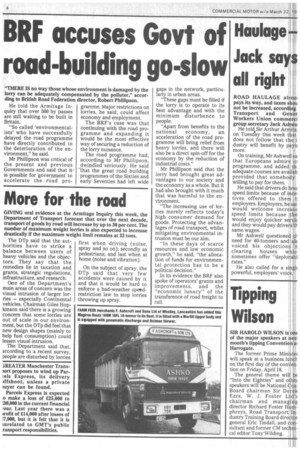BRF accuses Govt of road-building go-slow
Page 6

If you've noticed an error in this article please click here to report it so we can fix it.
"THERE IS no way those whose environment is damaged by the lorry can be adequately compensated by the polluter," according to British Road Federation director, Robert Phillipson.
He told the Armitage Inquiry that over 500 by passes are still waiting to be built in Britain.
"So called 'environmentalists' who have successfully delayed the road programme have directly contributed to the deterioration of the environment," he said.
Mr Phillipson was critical of the present and previous Governments and said that is possible for government to accelerate the road pro gramme. Major restrictions on lorries, he said, could affect economy and employment.
The BRF's case was that continuing with the road programme and expanding it would be the most effective way of securing a reduction of the lorry nuisance.
The road programme had, according-to Mr Phillipson, dwindled seriously. He said —that the great road building programmes of the Sixties and early Seventies had left wide gaps in the network, particularly in urban areas.
"These gaps must be filled if the lorry is to operate to its best advantage and with the minimum disturbance to people.
"Apart from benefits to the national economy, an acceleration of the road programme will bring relief from heavy lorries, and there will also be a direct spin-off for the economy by the reduction of industrial costs."
Mr Phillipson said that the lorry had brought great advantages to our society and the economy as a whole. But it had also brought with it much that was harmful to the environment.
"The increasing use of lorries merely reflects today's high consumer demand for goods. Protecting the advantages of road transport, whilst mitigating environmental intrusion must be our aim.
"In these days of scarce resources and low economic growth," he said, "the allocation of funds for environmental protection has to be a political decision."
In its evidence the BRF also spoke of operators' grants and improvements, and the "economic lunacy" of the transference of road freight to rail.
































































































































